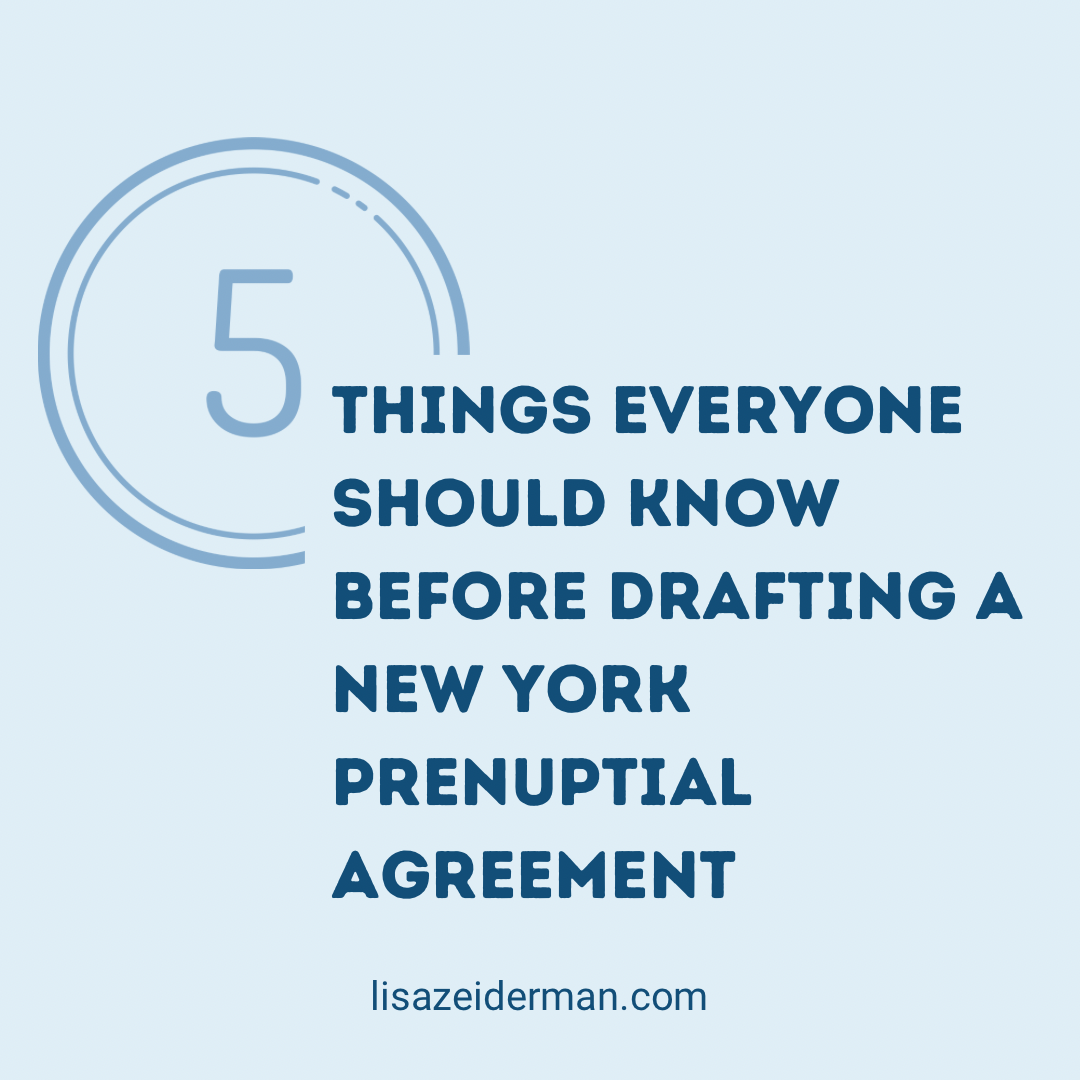What Is a Prenuptial Agreement?
It is important to be as prepared as possible at every stage of life. You can prepare for marriage by getting a legally valid prenuptial agreement. Each state has its own laws regarding prenuptial agreements, and what couples can agree to before divorce depends on what is allowable by state law.
New York has its specific requirements for valid prenuptial agreements. Every engaged couple should know what New York requires for a valid prenuptial agreement.
A prenuptial agreement is a legal document that details how married couples will divide property and deal with financial obligations in the event of a separation event and/or divorce. A couple can decide the outcome of some foreseeable pertinent situations before they get a divorce, such as how premarital property will be divided.
Benefits of Having a Prenuptial Agreement
If you have a prenuptial agreement and you and your spouse divorce, you may be able to avoid the costs and time of having a court decide how assets and liabilities will be divided, if and how much spousal support the less monied spouse will receive and even how items such as student loan and credit card debt will be divided. In New York, if you do not have a prenuptial agreement the courts will be determining what is equitable when dividing money and property. A prenuptial agreement allows you and your spouse to decide your own fate instead of leaving it to a total stranger– the Court.
If you are divorcing your spouse, odds are that you and your spouse are not seeing eye to eye. So, things can become contentious between you and your spouse quickly. If you have an agreement that is pre-approved by each spouse, the stress of dividing assets is lessened.
What Makes a Prenuptial Agreement Legally Valid?
Each state sets its own requirements for a legally valid prenuptial agreement. In New York to have a valid prenup, the following must occur:
- The agreement must be in writing.
- The terms of the agreement may not violate state law.
- Your prenup must be signed by both parties and notarized and acknowledged in the same form as is required to file a deed in New York. Remember, notarization is not enough– it must be acknowledged in a particular way or it is not valid.
- The prenup cannot be entered into as a result of duress, coercion, or intimidation. It cannot be unconscionable.
- Additionally, each party should make a full disclosure of all financial assets and debts.
Five Things Everyone Should Know Before Drafting a New York Prenuptial Agreement
1. You Need a Prenuptial Agreement in New York
It is important to be prepared. New York has specific divorce and family laws; however, the courts in the state will tend to rely on the agreements made by spouses in a prenup. You and your spouse should consider drafting a prenuptial agreement if any of the following apply:
- You want to prevent the court from managing your finances. If you and your fiancé agree to how property and money will be distributed in the event of a divorce, the state will likely defer to your agreement. If there is no agreement to defer to, then the court will equitably divide the parties’ assets.
- If this is not your first marriage, it may make sense to have a prenup. If you want to protect your assets and pass down money or property to children or grandchildren from previous marriages, a prenuptial agreement helps protect those assets from passing to your spouse in the event of a divorce.
- Protect yourself from paying more money to your ex-spouse than necessary. Equitable distribution does not mean that property or money is split equally between the parties. You may not receive what you think is fair after the court equitably divides your assets.
2. New York is an Equitable Distribution State
Equitable distribution is the manner in which the Court divides property that was acquired during a marriage. Equitable division of property does not necessarily mean equal. The court will look at the facts surrounding the divorce and decide how property rights and obligations should be divided. Specifically, the Court will look at each person’s contribution to the assets and liabilities.
New York law does not require that the court equally divide the couple’s assets at divorce. New York courts typically respect contracts made between parties, including prenups. If a couple has a legally valid prenuptial agreement, the prenup will likely control the distribution of property rights and financial obligations.
3. New York Prohibits Child Support and Custody Provisions in Prenups Unless Your Child is Born at the Time of the Execution of the Prenuptial Agreement
Many states prohibit a married couple from including provisions about child custody or child support in their prenuptial agreement. If your child is not born at the time of the execution of the prenuptial agreement, you cannot include any provisions about child support or custody in New York. If your child is born at the time of signing your prenuptial agreement, then you can include provisions regarding child support and custody. However, be aware that these provisions may be subject to modification later.
4. New York Laws About Alimony
Like all other states, New York has its own laws surrounding spousal support and what can be agreed upon in a prenuptial agreement. Many fiancées provide for spousal support (also known as alimony and/or maintenance) in their prenuptial agreement. There are several factors that a court uses to determine maintenance and support awards including but not limited to the length of the marriage.
If you and your spouse do not agree to spousal maintenance within your prenup, the court will use the following factors to determine if one spouse must pay the other maintenance:
- Each spouse’s income
- How long the parties were married
- How the court distributed marital property (if the parties did not have a prenup)
- The age and physical or mental health of each spouse
- Each spouse’s capacity to earn an income
- Where the children primarily reside
- The tax consequences of awarding spousal maintenance
- The ability of the spouse seeking maintenance to support themselves or how long and what training is required to make that spouse self-sufficient
- The availability of and cost of health insurance
- Any other factor that the court finds appropriate
5. You Do Not Need an Attorney to Draft a Prenuptial Agreement
The expense of drafting a prenuptial agreement should not deter you from completing one. You do not need an attorney to draft a legally valid New York prenuptial agreement. If you’re looking for an affordable, collaborative, and easy way to draft a prenup, consider using HelloPrenup. After completing the HelloPrenup process, just take it to get signed and acknowledged in the form required to file a deed in New York by a notary public. The best part is that if you want to have an attorney look over your agreement later, your document is easily accessible. Check out more about how it works here.
It is so important that you are prepared for the possibility of divorce. No one wants to think about divorce, especially when they are in engaged bliss, but, unfortunately, divorce is a reality in the world in which we live. To be as prepared as you can, draft a prenuptial agreement with your fiancé. If you take the responsibility of drafting a prenup in your own hands, you can approach distribution of property with empathy and compassion before a divorce.

